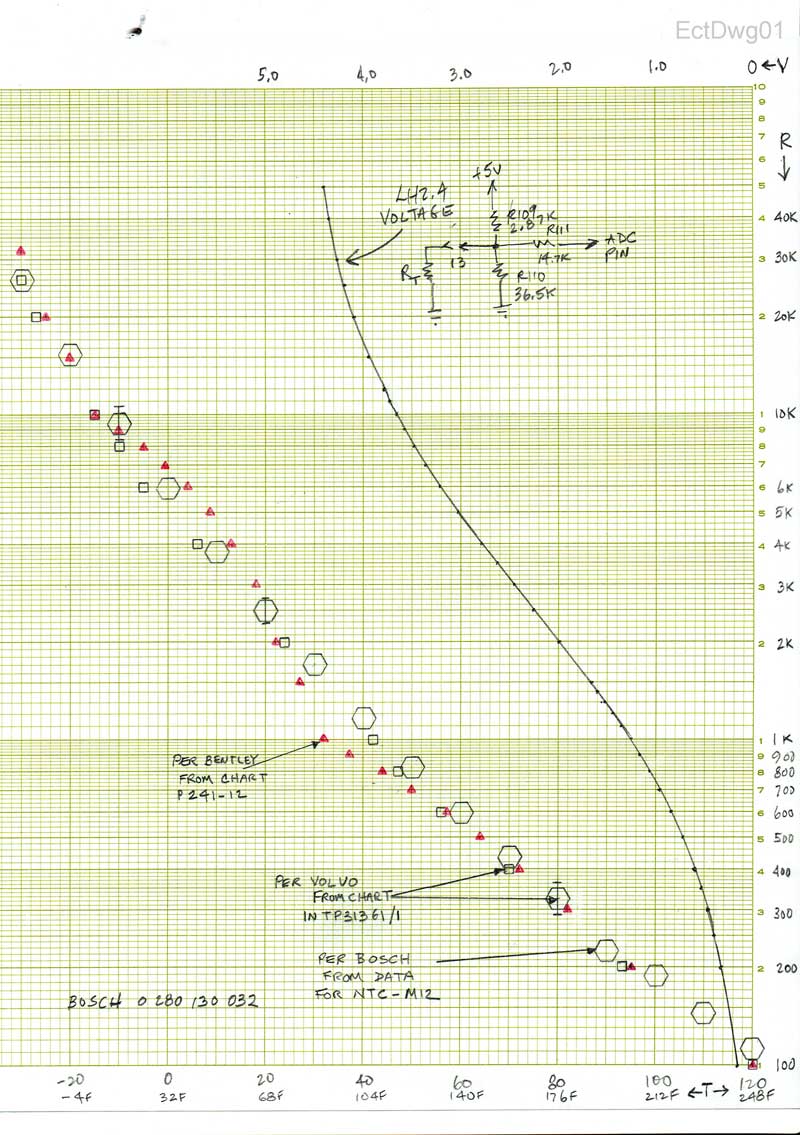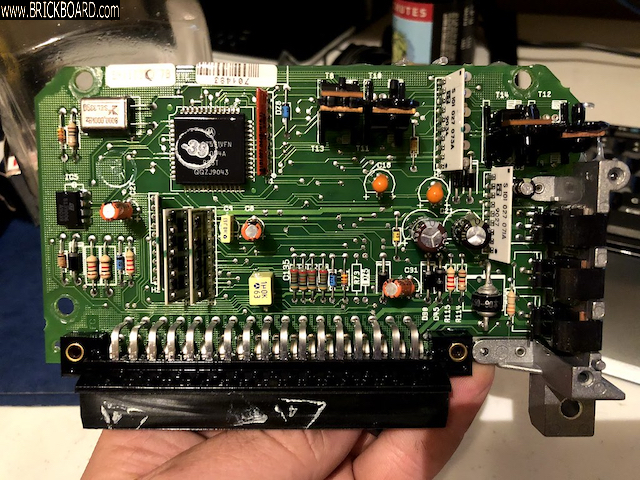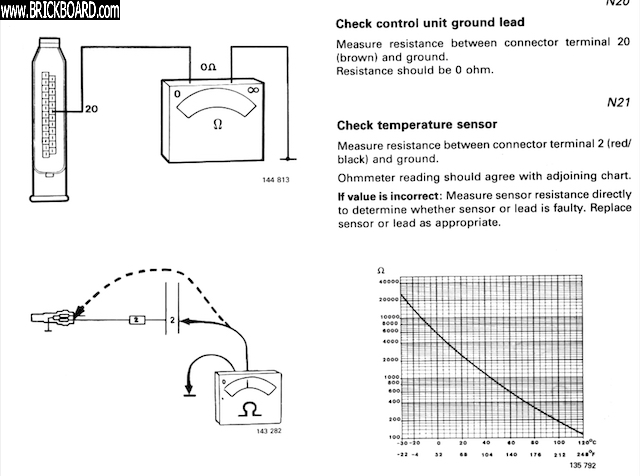posted by
someone claiming to be Beforemountains
on
Fri Jan 10 08:25 CST 2020 [ RELATED]
|
|
I have a 94 945 with Regina. I’ve been having some cold start and cold running issues. I suspect the ect. With the ect unplugged, I checked the reference voltage at the ect connector. 5v from the ignition computer, and only 4.5v from the fuel ecu. I also only get 4.5v from the air temperature sensor connector. I would expect to see 5v at both locations. Does that 4.5v seem low?
|
|
-

|
|
For grins, I'm gonna answer your question directly, but from a Bosch perspective, because I have no Regina ECU to look at. And I have a feeling you already know the mechanic's shop tech writers suggest using an ohmmeter.
In the Bosch ECU, the current source used to measure the ECT sensor's thermistor is generated by the circuit below.

So if you were asking about what you should see on the ECT connector from an LH2.4 ECU, I can confirm it would be near 4.6 V calculated from the resistor values when the thermistor is not present. In my experience, everything I've seen in Regina mirrors the Bosch when excluding the MAP sensor, titania O2, and IAT sensor part, so I will bet your Regina ECU is OK in that regard, and you won't need to spend $100 on a guess.
--
Art Benstein near Baltimore
98% OF AMERICANS SAY 'OH S***' BEFORE GOING IN THE DITCH ON A SLIPPERY ROAD.
THE OTHER 2% ARE FROM MAINE, NEW HAMPSHIRE & VERMONT, AND THEY SAY, 'HOLD MY BEER AND WATCH THIS.'
|
|
-
posted by
someone claiming to be beforemountains
on
Tue Jan 14 10:09 CST 2020 [ RELATED]
|
|
Thanks for answering, Art. I was expecting the voltage to be 5v--4.6 volts seems like an odd figure. Additionally, the Volvo service manual stated that it should be approximately 5v.
|
|
-
posted by
someone claiming to be Gepogoji
on
Tue Jan 14 14:35 CST 2020 [ RELATED]
|
|
This may be an elementary question but have you read out any codes that may be stored in the OBD?
|
|
-
|
|
|
Dear Art,
Having spare ECUs would tremendously help the OP. Its not just for the 5v reference issue but for future troubleshooting too. At sub 100USD I think its real bargain to have 3 pairs of them. With a car this old some ECU components could have dried out eg. electrolytic capacitor. I let the OP decide.

Unless the OP loves to dig into this for breakfast (I would), having spare ECU is better.
(Photo taken from TB: https://forums.turbobricks.com/showthread.php?t=343330)
Amarin.
|
|
-
posted by
someone claiming to be beforemountains
on
Tue Jan 14 10:22 CST 2020 [ RELATED]
|
|
It wouldn't be a terrible idea to get a backup ECU. The ECU is my wagon is part number 9146261. I have found another ECU 6842882. It appears that one is for 93 and prior Regina 940s and would probably be compatible.
|
|
-

|
|
Hi Amarin,
You are right. For general troubleshooting it is so nice to be able to swap those components which are not easily tested, and for 20 years I've been suggesting a spare ECU and AMM. Of course, 20 years ago these parts were plentiful in the yards and didn't cost anywhere near $100 where I live.
I am suggesting the 4.5V OP sees is not a problem, so having a second ECU to measure may not in itself be worth $100. It isn't a reference voltage strictly speaking, but a current source for the thermistor, which could be checked by draining it to ground with a fixed resistor matching one of the points on the chart I provided, and comparing the resulting voltage. OP is probably thinking we all check this open circuit voltage so he can just ask the forum instead of buying another unit. If you have a Regina car, will you check for him?
My experience reading these pages is there are a few things that rarely fail. Bosch EZK boxes, Rex and Regina boxes among them. The ONLY failures I've heard of are the result of water ingress. I'm not yet convinced every electrolytic capacitor is aged out, and if they were, the spares are of the same vintage.
The TB thread should be very interesting to those owning Rex/Regina cars. The photos there look almost good enough to trace the circuit back from the pins, if the PDFs mentioned don't include full schematics. However, the Regina box does appear to make use of custom SIP hybrids, which, like the one hybrid in the Bosch fuel box, make things difficult in reverse.
--
Art Benstein near Baltimore
Have you ever noticed? Anybody going slower than you is an idiot, and anyone going faster than you is a maniac.
|
|
-
|
|
|
Dear Art,
You're right about Bosch & Regina ECU rarely fails. When they fail you'll know it instantly if there's a spare available. Instead of doing a simple ECU swap, I see some owners throwing parts at the car, spending some $$ before finally coming back to the ECU. Of course this scenario rarely happens but who knows when it happens? (taking into context of old cars here).
Yes I'm convinced most (if not all) electrolytic capacitors with rubber plug at its base do age out. The quickest one that does lives inside our speedometer having exposed to lots of underdash heat. The ones with not so fast aging (about 20 to 30 years I suppose) lives inside our ECU. The only one that doesn't seem to age is the bakelite body electrolytic capacitor with epoxy sealed base in my hi-fi preamp made by Roederstein. But then the preamp has always been running cool. My point is capacitors in spare ECUs kept in cool (and dark?) places could maintain their value for much longer (even with same vintage).
Lastly I remember capacitors datasheet do give life estimation in hours. Anyway I should stop rambling about capacitors here, dinner's getting cold :-)
Regards,
Amarin.
|
|
-

|
|
Hi Amarin,
You are right about the caps too. All of them have a finite age, and temperature is the biggest factor, both internally generated by their electrical duty and ambient.
I wouldn't be so confident about those sealed with epoxy, based on what I think are the most notorious capacitor failures among those used in our Volvos. The clocks use electrolytic caps with epoxy-sealed bases. But, rather than construction, the use of the capacitor (its electrical duty) has a lot to do with our perception of its life.
Choosing the right part for a design has to take this duty into consideration, for the selection process is more than just quality vs. price. The automotive temperature range is somewhere between that for consumer products and satellite electronics.
For example, if the capacity in a part used for timing reduces by 50%, the instrument panel clock will stop, but if the same reduction occurs in a part which smooths the speedometer needle or decouples the power supply, you won't notice it. Even if it fails completely open, the effect is subtle.
Maybe in your pre-amp, the electrolytic caps are used to decouple power line frequency hum. Like with the car's shock absorbers, the damping function can reduce gradually without notice as we humans just adapt to the subtle decline in performance.
When I said I wasn't convinced, I was opposing the tendency of folks who have just learned of the "great capacitor plague" of the early 2000's and feel they could repair any device by replacing the caps.

PS, I hope I didn't spoil your dinner with that old picture of lentil soup. :)
--
Art Benstein near Baltimore
A Local Area Network in Australia is the LAN down under.
|
|
-
|
|
|
Dear Amarin,
Hope you're well. I concur as to your point as to capacitors' service life benefiting from storage in cool, dark places. I've stored under such conditions spare ECU, Ignition Control Units, ABS Control Units, and SRS Control Units. I hope that should I have a need, one of these stored units will remain serviceable.
Because most household appliances rely on a "control board", it is a good idea to acquire a spare "control board", soon after buying the appliance. Most appliance makers discontinue spare parts about 10 years after a model goes "obsolete". That's precisely when spares are needed.
Most appliance "control boards" are made from the same materials as are used in personal computers, which machines go obsolete after five years. Thus, appliance "control boards" are not built to last as long as are auto computer modules.
While a refrigerator's compressor might have a working life of 20+ years, if the control board fails - and a replacement can't be had - the refrigerator is "scrap metal".
Hope this helps.
Yours faithfully,
Spook
|
|
-

|
|
Hi Spook,
You hit the nail on the head. Complexity, time, and temperature.
A childhood memory has my dad explaining the choice in replacing the ringer washing machine. He advocated choosing a modern one with the fewest "bells and whistles" versus the feature-laden models with more to go wrong. I give him credit for inspiring my passion for repair.
Perhaps, as a result, my PC is 15 years old, the fridge is 35, my car is 40, the clothes washer 44, the dishwasher exactly as old as I am, and my understanding of electrolyte formulas even older.
I've had to repair control boards in more modern appliances for my kids. One fridge made it 5 years before puking a solid-state relay. Following your suggestion of keeping a spare control board in cold storage would have helped me with our kitchen range. It is more modern, and its control board has a dimming vacuum fluorescent display - a part that is always custom to the model, and may have a shorter life expectancy than juicy capacitors.
So, with infotainment systems relying on quickly-changing technology, what incentive do auto manufacturers have to make the rest of the car last? None I can figure.
Don't you have a Regina-fueled car? Maybe you could provide the OP with that voltage check if Amarin cannot.

--
Art Benstein near Baltimore
A grenade thrown into a kitchen in France would result in Linoleum Blownapart.
|
|
-
|
|
|
Have you tested the ECT sensor resistance in the pot of cold-to-progressively-warmer water test using your ohm meter and cooking thermometer and compared the results to the published temp vs resistance curve? About four data points between near-freezing and near-boiling should be adequate to make a comparison. You can interpolate everything in between.
I might add that in all the years I’ve been reading this forum I believe I’ve only heard about one failure of the Regina (Bendix) computer and that was due to water intrusion into the connector.
|
|
-

|
|
Hi Chris,
Yes, I think we both read the same post about the windshield leak and saw a picture of the white corrosion.
I'm not sure in your reply to me if you are asking me whether I cooked an ECT sensor, or if you're asking the OP. My experience with these NTC thermistors is they fail because of physical harm or moisture, but otherwise are very consistent sample to sample. Yet, I've never done tests on the dual sensor used in EZK/LH2.4 and Rex/Regina. Last time I checked a sensor it was a gauge sensor, and only to demonstrate.

It was a new sensor, so it didn't ruin the soup.
--
Art Benstein near Baltimore
When a clock is hungry, it goes back four seconds.
|
|
-
|
|
|
Hey Art, sorry for the confusion. My question was directed to OP.
Although quite reliable, I have had a sensor or two go bad in the past, particularly on the old D-jets. Nice pic of the test procedure but you’re the first person I know of that combined testing with dinner prep. Did you find the resistance to be just a lintel off?
|
|
-
|
|
|
Dear Chris Mullet,
Hope you're well. Using soup as a test medium for a temperature sensor probably boosts the readings readings relative to those that would be had if plain water were used, especially if the soup recipe included Carolina Reaper pepper.
Hope this helps.
Yours faithfully,
Spook
|
|
-
|
|
|
Should check resistance at fuel ECU connector instead (unplugged from ECU).
Diagram below from Volvo greenbook TP31397/1, Regina section:

Regarding the 5v reference its better if you have spare ECU to compare with. Used ECU could be had for less than 100USD nowadays. Some seller even offer more than 1 set (fuel & ignition) for said price. Should get one.
See:
https://www.ebay.com/itm/Volvo-REGINA-REX-940-or-740-Fuel-Ignition-ECU-Computers-Late-Style-3-SETS/401828779715?hash=item5d8edc96c3:g:NmQAAOSwiR5dPEkf
Amarin.
|
|
-
|
|
|
Dear Beforemountains,
Hope you're well and that New Year has started nicely. To assess an engine coolant temperature sensor - Volvo #1346030 / Bosch #0 280 130 032) - what matters is resistance (Ohms [Ω]).
The Volvo Pocket data booklet - Cars (700, 850, 900; 1991-1996, p. 34) shows the following:
-10⁰C / 14⁰F = Ω 8200 - 10600
+20⁰C / 68⁰F = Ω 2200 - 2800
+80⁰C / 186⁰F = Ω 250 - 400.
These values are for cars using Rex/Regina fuel/engine management. The same sensor is used in cars with Rex/Regina or Bosch fuel/engine management.
Hope this helps.
Yours faithfully,
Spook
|
|
|
|
|







